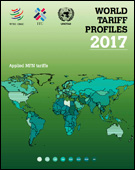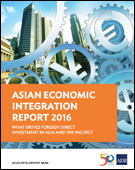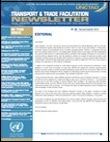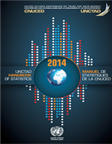World Investment Report 2023 This report monitors global and regional foreign direct investment trends and national and international investment policy developments. Across South Asia in 2022, FDI inflows rose by 4.4% to $58 billion while FDI outflows rose by 1.1% to $16 billion. South Asia posted the largest increase in greenfield projects, with announced greenfield projects in India more than doubling in 2022. Author: United Nations Conference on Trade and Development Year: 2023 Download Tags: UNCTAD, Trade, South Asia Trade and Development Report 2022South Asia is projected to expand at 4.9% in 2022 amid inflation and high energy prices. Balance of payment constraints in Bangladesh and Sri Lanka have led these countries to place restrictions on the consumption of electricity. In India, where the economy expanded by 8.2% in 2021, the easing of supply chain disruptions and the rise in domestic demand has led to a deceleration in growth. Author: United Nations Conference on Trade and Development Year: 2022 Download Tags: UNCTAD, Trade, South Asia World Investment Report 2022 In 2020–2021, foreign direct investment (FDI) in South Asia fell by 26%, to $52 billion, with large mergers and acquisitions from 2020 not repeated in 2021. Flows to Bangladesh rose by 13% to $2.9 billion, while inflows to India declined to $45 billion. However, India announced new international project finance deals, including 23 in renewable energy. Outward FDI from South Asia, mainly from India, rose by 43% to $16 billion. Author: United Nations Conference on Trade and Development Year: 2022 Download Tags: UNCTAD, Trade, South Asia, Bangladesh, India, Renewable Energy World Investment Report 2021Global flows of foreign direct investment fell by one third to $1 trillion in 2020 due to the coronavirus disease (COVID-19) pandemic. In South Asia, foreign direct investments rose by 20% to $71 billion in 2020, driven mainly by strong mergers and acquisitions in India. Inflows in Bangladesh contracted by 11% and in Sri Lanka by 43%, where inflows will take longer to recover. This report monitors global and regional investment trends to support national and international policymakers. Author: United Nations Conference on Trade and Development Year: 2021 Download Tags: COVID-19, Bangladesh, India, Sri Lanka, FDI, South Asia, Sustainable Development Goals, UNCTAD The Least Developed Countries Report 2020: Productive Capacities for the New DecadeThe coronavirus disease (COVID-19) pandemic is taking its toll on economies of least developed countries (LDCs). To help economies and aid their recovery from the pandemic, this report lays out proposed measures for improving productive capacities of LDCs. It looks at mechanisms for regional cooperation in the areas of green technologies, industry, and digital technologies. The report takes a look at regional integration schemes, such as the South Asian Free Trade Area, and discusses how these could be instrumental in the sustainable and inclusive recovery for LDCs. Author: United Nations Conference on Trade and Development Year: 2020 Download Tags: South Asia, UNCTAD, Least Developed Countries, Regional Cooperation, SAFTA Adapting the use of Asycuda World to the Covid-19 Situation: Guidelines to Customs AdministrationsCustoms administrations need to act decisively to prevent the spread of the coronavirus disease (COVID-19). The Automated System for Customs Data (ASYCUDA) World system helps cross-border agencies deal with the pandemic through procedures that limit virus transmission in work areas, while ensuring smooth cross-border movement of essential products. The system reduces the need for face-to-face interaction by allowing agencies and traders to exchange data, send and receive documentation, and expedite various trade transactions. Author: Automated System for Customs Data and United Nations Conference on Trade and Development Year: 2020 Download Tags: Customs, Trade, UNCTAD World Investment Report 2019This report monitors global and regional foreign direct investment trends and national and international investment policy developments. Foreign direct investments (FDI) in South Asia grew by 4% in 2018 to $54 billion, with India accounting for $42 billion. International cooperation in the development of special economic zones (SEZs) has been increasing. In developing countries, many SEZs are built through bilateral partnerships or as part of development cooperation programs. In South Asia, the number of SEZs is set to increase substantially. India has 200 new zones in the pipeline, while Bangladesh has 60, and Nepal 12. Author: United Nations Conference on Trade and Development Year: 2019 Download Tags: Bangladesh, India, Nepal, FDI, Investment, South Asia, UNCTAD World Investment Report 2018In India, foreign direct investment (FDI) inflows dropped from $44 billion in 2016 to $40 billion in 2017. Across South Asia, FDI inflows are predicted to stagnate or decline marginally in 2018. The global trend in FDI flows demonstrates the need for open, transparent, and non-discriminatory investment policies to maintain an environment conducive for investment. New types of industrial policies are emerging to respond to opportunities and challenges brought about by a new industrial revolution. This report examines investment policy tools available in the new environment. Author: United Nations Conference on Trade and Development Year: 2018 Download Tags: Connectivity, FDI, Global Value Chains, India, Investment, Policy, Sustainable Development Goals, South Asia, UNCTAD World Trade Statistical Review 2018World Trade Statistical Review 2018 presents the latest developments in world trade, with analysis of recent trends for trade in goods and services. It looks at the performance of developing economies, where merchandise exports increased by 12% in 2017. The book also looks at value-added exchanges and digital trade, and provides data on trade-facilitating measures and on the implementation of regional trade agreements, such as the South Asian Free Trade Area. Author: World Trade Organization Year: 2018 Download Tags: Trade Facilitation Agreement, WTO, UNCTAD National Trade Facilitation Committees: Beyond Compliance with the WTO Trade Facilitation Agreement?This study presents analysis of 59 national trade facilitation committees from around the world, based on a survey by the United Nations Conference on Trade and Development. It outlines how countries are applying the World Trade Organization Trade Facilitation Agreement article number 23.2 relating to the formation of national committees on trade facilitation. The study includes analysis of national trade facilitation committees’ institutional frameworks, composition, gender mainstreaming policies, communications activities, and financing sources. It also gives a summary of outcomes, obstacles faced, and lessons learned by the committees. Author: United Nations Conference on Trade and Development Year: 2017 Download Tags: Sri Lanka, Trade Facilitation Agreement, Transport, UNCTAD, WTO 2017 Handbook of StatisticsThis report presents statistics and indicators on international trade, investment, and development. It includes data on developing economies in South Asia, which in 2016 accounted for about $401 billion in merchandise exports and $529 billion in merchandise imports, $192 billion in service exports and $175 billion service imports, and 6.7% gross domestic product (GDP) growth. Author: United Nations Conference on Trade and Development Year: 2017 Download Tags: FDI, South Asia, Trade, Transport, UNCTAD  World Tariff Profiles 2017World Tariff Profiles is a joint publication of the World Trade Organization (WTO), International Trade Centre, and the United Nations Conference on Trade and Development devoted to information on market access for goods. It contains comprehensive data on tariffs and non-tariff measures imposed by over 170 countries and Customs territories. This year’s edition takes a close look at export diversification, analyzing to what extent economies have diversified their exports over time. Many countries make it a policy to diversify exports to obtain bigger market shares. An overview of export diversification shows how India, Myanmar, Sri Lanka, Bangladesh, and Bhutan have grown in the last two decades. Bangladesh in particular has achieved significant increase in terms of both product coverage and market reach. Author: World Trade Organization, International Trade Centre, and the United Nations Conference on Trade and Development Year: 2017 Download Tags: Bangladesh, Bhutan, Export, India, Maldives, Myanmar, Nepal, Sri Lanka, Tariffs, Trade, UNCTAD, WTO World Investment Report 2017This report presents foreign direct investment (FDI) trends and prospects at global, regional and national levels. FDI flows to developing Asia contracted by 15% to $443 billion in 2016. This decline was relatively widespread, except in South Asia, where several countries including Bangladesh and Nepal are expected to receive more FDI in the coming years. The report investigates the internationalization patterns of digital multinational enterprises, as well as the effect of digitalization on global companies across all industries. It provides insights to policymakers on how the digital economy impacts investment policies and how investment policy can support digital development, with a view toward achieving the SDGs. Author: United Nations Conference on Trade and Development Year: 2017 Download Tags: FDI, Global Value Chains, Investment, Policy, South Asia, UNCTAD, Bangladesh, India, Nepal  Asian Economic Integration Report 2016: What Drives Foreign Direct Investment in Asia and the Pacific?The 2016 Asian Economic Integration Report reviews regional economic cooperation and integration in Asia and the Pacific, amidst the rising global uncertainty following the United Kingdom’s referendum on leaving the European Union and the U.S. election, slower-than-expected global economic recovery, and ongoing economic restructuring in the People’s Republic of China and growth moderation. Asia faces heightened uncertainty–trade growth decelerated in 2015, falling to 2.3% in 2015; subregional trade linkages continue to strengthen, but inter-subregional trade linkages weakened; and non-tariff measures have become major obstacles to trade. In South Asia, SASEC cooperation has improved access to key markets in smaller economies, reduced real trade costs and behind-the-border barriers to stimulate investment; and enabled cross-border power exchanges to ensure power supply affordability, reliability, and overall grid stability. However, the SASEC agenda needs to be framed within wider integration processes taking place in Asia in the next decade to enhance economic linkages, and harness the full potential of Asian integration. Author: Asian Development Bank Year: 2016 Download Tags: ADB, ASEAN, Asia-Pacific, Development, FDI, Free Trade Agreements, Regional Cooperation, Regional Integration, SASEC, Trade Facilitation, UNCTAD, Bangladesh, Bhutan, India, Maldives, Nepal, Sri Lanka  UNCTAD Transport and Trade Facilitation Newsletter No. 66 – Second Quarter 2015The Transport and Trade Facilitation Newsletter highlights trade facilitation support across countries and shares innovations from Cote d’Ivoire and Greece, including the new UNCTAD Technical Note on World Trade Organization (WTO) Trade Facilitation Agreement (TFA) ratification. It also features the meeting of the Global Facilitation Partnership for Transportation and Trade -- an event that brings together the private sector, WTO Member States and international organizations -- in a discussion to support TFA implementation. The Newsletter further shows United Nations Regional Commissions Global Survey on Trade Facilitation and Paperless Trade -- a response to the lack of comprehensive cross-country data and a guide to better understand and monitor trade facilitation implementation and paperless trade measures. Author: United Nations Conference on Trade and Development Year: 2015 Download Tags: Transport, Trade Facilitation, WTO, UNCTAD National Trade Facilitation Bodies in the World This UNCTAD publication provides the first, in-depth quantitative analysis of 50 existing national trade facilitation bodies and a first-hand set of recommendations from experiences of participating stakeholders. It offers policy-oriented conclusions to assist countries about to set up or strengthen their national trade facilitation working groups. The study reveals that the biggest challenge for trade facilitation working groups is sustainability. Its determining elements include the administrative culture of each country, level of development, or type of body and geographical region. Author: United Nations Conference on Trade and Development Year: 2014 Download Tags: Trade Facilitation, Trade Policy, Sustainability, UNCTAD, Bangladesh, Bhutan, Nepal, Sri Lanka UNCTAD Transport Newsletter: Fourth Quarter 2014This United Nations Conference on Trade and Development (UNCTAD) newsletter focuses on the development dimension and benefits of the World Trade Organization Trade Facilitation Agreement. It includes sections on the national trade facilitation committees, project proposal for the implementation of trade facilitation measures contained in the agreement, and improvement in implementation of sanitary and phytosanitary measures to facilitate trade. It also includes UNCTAD’s contribution to trade facilitation in Landlocked Developing Countries and Small Island Developing States. Author: United Nations Conference on Trade and Development Year: 2014 Download Tags: Trade Facilitation, WTO, UNCTAD, Transport, Development, Sanitary and Phytosanitary Measures, Energy, India  UNCTAD Handbook of Statistics 2014The UNCTAD Handbook of Statistics is a collection of statistics and indicators relevant to the analysis of international trade, investment and development. The 2014 edition shows the increasing convergence of trade balance between developing and developed economies continues. The report also includes regional trade data from South Asia that shows average annual growth rate of international trade improved from a previous deficit of -7.1% in 2012 to -0.1% in 2013. However, trade balance ran a deficit of -26.51% compared to the previous year's -25.94%. Trade indicators also report intra-trade in South Asian Association for Regional Cooperation region rose modestly from US$ 20,219 million to US$ 23,181 million between 2012 to 2013 and maintains intra-regional trade percentage at 5.8%. Author: United Nations Conference on Trade and Development Year: 2014 Download Tags: UNCTAD, Regional Trade, Development, Bangladesh, Bhutan, India, Maldives, Nepal, Sri Lanka, Transport Review of Maritime Transport 2014The Review of Maritime Transport is an annual UNCTAD flagship publication since 1968. It provides analysis of structural and cyclical changes affecting seaborne trade, ports and shipping, freight markets, and transport and regulatory frameworks. It further presents statistics, data, and insights on ownership of the world fleet, with South Asia dominating the market for ship recycling. This year’s special chapter focuses on the challenges faced by the world’s Small Island Developing States (SIDS) and reviews shipping-related challenges resulting from SIDS size, remoteness, and exposure to natural hazards, including impacts of climate change. Author: United Nations Conference on Trade and Development Year: 2014 Download Tags: Transport, Ports, Small Island Developing States, UNCTAD, Trade, South Asia, Bangladesh, India, Maldives, Sri Lanka |




